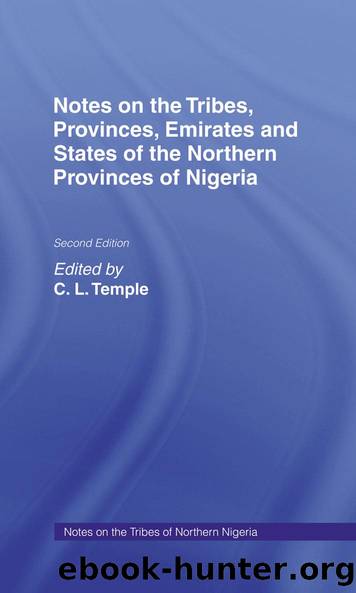Notes of the Tribes, Emirates Cb by O. Temple

Author:O. Temple [Temple, O.]
Language: eng
Format: epub
Tags: Social Science, Anthropology, General, Regional Studies
ISBN: 9781136969454
Google: 4p4uAgAAQBAJ
Publisher: Routledge
Published: 2013-11-26T04:55:39+00:00
MUMUYE.
Off-shoots: WAKA, YAKOKO, YUNDAM, ZINNA.
AUTHORITIES:
MURI:
Mr. H. M. Brice-Smith.
Mr. T. H. Haughton,
YOLA:
Captain E. A. Brackenbury.
Mr. S. H. P. Vereker.
Mr. G. W. Webster.
The name Mumuye, by which this people are commonly known, was given to them by the Filane, the native name being Fungun or Zagum.
They occupy an area of 530 square miles in the Provinces of Muri and Yola, with a population of some twenty-five thousand. Two-thirds of the tribe (17,079) are in Muri, where they have recently been incorporated in the Emirate. Those in Yola, together with the Chamba, with whom they have intermarried, have been put under the Yola Emirate, in the pagan division.
They were once conquered and enslaved by the Jukon, but had long since regained independence when the Filane drove them from the northern plains to the hills. They joined together in fighting the common foe, but at other times fought each other freely.
There is no paramount Chief, each tribal group being under a Chief, known as Panti, an hereditary office passing to the eldest male member of the family, but which carried with it little authority.
Land was held by these Chiefs in trust for their people, but once a right of occupancy was granted, the occupier had the right to sell, lease or give his claim to another.
Cairns and hedges of âyawiâ grass mark the boundaries; any dispute concerning them is settled by the Elders, the claimant first straddling the debated area and invoking death upon himself before next harvest if he lies.
Debt is universal and a count is kept by tallies of sticks; in Yola Province force cannot be used to make a free man pay, but in Muri property may be seized, or a woman sold, in settlement of the contract.
Murder was avenged by the family of the deceased (the slaughter of a witch or a wizard was accounted no murder); and adultery by the aggrieved husband, though he might waive his right to kill, for a fine of seven goats and a dog.
A thief was commonly sold as a slave.
The Mumuye inhabit a mountainous, well-watered and fertile country. In the heart of the hills huts are found on the peaks amongst the rocks, but the villages are more usually built round the base. The compounds are circular in shape, and are surrounded by zana matting, which encloses two or more round huts with thatched roofs, and several corn-bins. Every township contains stables for goats, made of large stones with a flat top. The villages vary in size from 30 to 250 houses. They are commonly surrounded with cactus hedges, and are further defended by deep pits in the bottom of which pikes are placed.
Large cow-hide shields are used, and the weapons are spears, short swords, and bows and arrows. The latter are tipped with barbed steel, which are lightly lashed on to the shafts, the lashings being smeared with poison for three or four inches. When the missile strikes the shaft comes off, leaving the head in the wound and breaking up the poison, which, if fresh, is strong enough to kill a buffalo in half an hour.
Download
This site does not store any files on its server. We only index and link to content provided by other sites. Please contact the content providers to delete copyright contents if any and email us, we'll remove relevant links or contents immediately.
Machine Learning at Scale with H2O by Gregory Keys | David Whiting(4313)
Never by Ken Follett(3957)
Fairy Tale by Stephen King(3399)
Will by Will Smith(2921)
Hooked: A Dark, Contemporary Romance (Never After Series) by Emily McIntire(2556)
The Dawn of Everything: A New History of Humanity by David Graeber & David Wengrow(2210)
The Becoming by Nora Roberts(2204)
A Short History of War by Jeremy Black(1849)
HBR's 10 Must Reads 2022 by Harvard Business Review(1845)
The Strength In Our Scars by Bianca Sparacino(1844)
Go Tell the Bees That I Am Gone by Diana Gabaldon(1758)
A Game of Thrones (The Illustrated Edition) by George R. R. Martin(1749)
515945210 by Unknown(1668)
Bewilderment by Richard Powers(1622)
443319537 by Unknown(1560)
The 1619 Project by Unknown(1462)
The Real Anthony Fauci: Bill Gates, Big Pharma, and the Global War on Democracy and Public Health (Childrenâs Health Defense) by Robert F. Kennedy(1409)
How to Live by Derek Sivers(1365)
All About Love: New Visions by bell hooks(1355)
